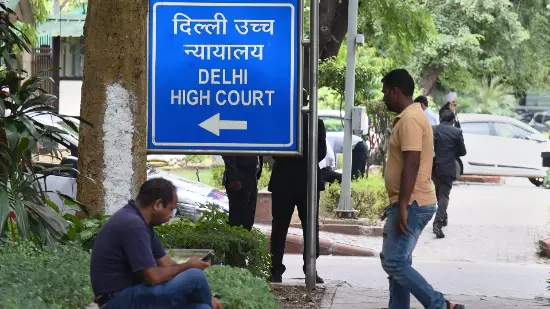Delhi HC holds it has jurisdiction to hear PFI's plea against UAPA tribunal order

New Delhi: The Delhi High Court has held that it has jurisdiction to entertain a petition under Article 226 of the Constitution against the order of the Unlawful Activities (Prevention) Act Tribunal, according to a detailed order released on Tuesday on a PFI plea.
Article 226 deals with the power of high courts to issue certain writs.
The high court, while holding as maintainable a plea by the Popular Front of India (PFI) against a tribunal order upholding the Centre's five-year ban on the organisation, said that the functions assigned to the Tribunal cannot be equated with the functions of a civil court.
In its Monday order, the HC also issued a notice to the Centre, asking it to respond to the PFI's plea within six weeks.
The Centre banned the PFI for five years for its alleged links with global terrorist organisations, such as ISIS, and for trying to spread communal hatred in the country.
It had argued in the court that the petition was not maintainable as the UAPA tribunal was headed by a sitting high court judge and therefore the order could not be challenged under Article 226.
The court did not agree with the submission of the Centre that the High Court will not have jurisdiction to issue a writ of certiorari (authority exercised by the Supreme Court or a High Court to quash orders issued by subordinate courts or tribunals) sought against the order passed by the Tribunal confirming the ban declaration by the government.
The court also granted two weeks to the PFI to file its rejoinder thereafter and listed the matter for further hearing on January 20, 2026.
"In view of the aforesaid, we hold that this court has jurisdiction to entertain and maintain a petition under Article 226 of the Constitution of India against the order of the tribunal passed under Section 4 of the Act. We, thus, hold the instant petition to be maintainable," a bench of Chief Justice Devendra Kumar Upadhyaya and Justice Tushar Rao Gedela said.
It said the function and role assigned to the Tribunal under Section 4 of the UAPA Act is to decide the reference made to it by the central government by opining as to whether or not there exists sufficient cause for declaring the association as unlawful.
"As a matter of fact, the role assigned to the Tribunal is not to decide the lis (litigation) between the parties in the sense a lis is decided by a civil court; rather, the function of the Tribunal is, in a way, to confirm the declaration made by the Central Government under Section 3(1) of the Act," the court said in its 25-page order.
It said the declaration made by the central government does not become final merely on its notification in the official gazette in the sense that the provision of the Act provides that such a declaration shall not have effect until the tribunal confirms it.
The bench said it will be anomalous to hold that the jurisdiction of the high court under Article 226 of the Constitution of India will not be available for issuing a writ of certiorari against the tribunal's order.
"We have no hesitation to hold that the instant petition is maintainable under Article 226 of the Constitution," it said.
The PFI challenged the March 21, 2024, verdict of the UAPA tribunal confirming the Centre's ban order dated September 27, 2022.
The Centre's counsel had argued, "The tribunal was manned by a sitting judge of this high court and a high court judge is not subordinate to this court."
The counsel for PFI had submitted that the writ petition under Article 226 of the Constitution was maintainable against the order of the UAPA tribunal comprising a sitting high court judge.
"There is a provision to the expenses under the UAPA so the high court's funds do not go to the tribunal. A separate expense has to be provided to the tribunal. The tribunal is able to regulate its own procedure, so the Delhi High Court Rules do not apply to the tribunal," the counsel had said.
The PFI had argued that when the high court judge was acting as a tribunal, he was the tribunal and not a high court judge.
The government declared as "unlawful associations" the PFI and its associates or affiliates or fronts, including Rehab India Foundation, Campus Front of India, All India Imams Council, National Confederation of Human Rights Organisation, National Women's Front, the Junior Front, Empower India Foundation and Rehab Foundation, Kerala.
The notification proscribing the organisation said the Centre is of the firm opinion that it is necessary to declare the PFI and its associates, affiliates or fronts "unlawful associations" with immediate effect under the UAPA.
More than 150 people allegedly linked to the PFI were detained or arrested in raids and a pan-India crackdown by law enforcement agencies in September 2022.



